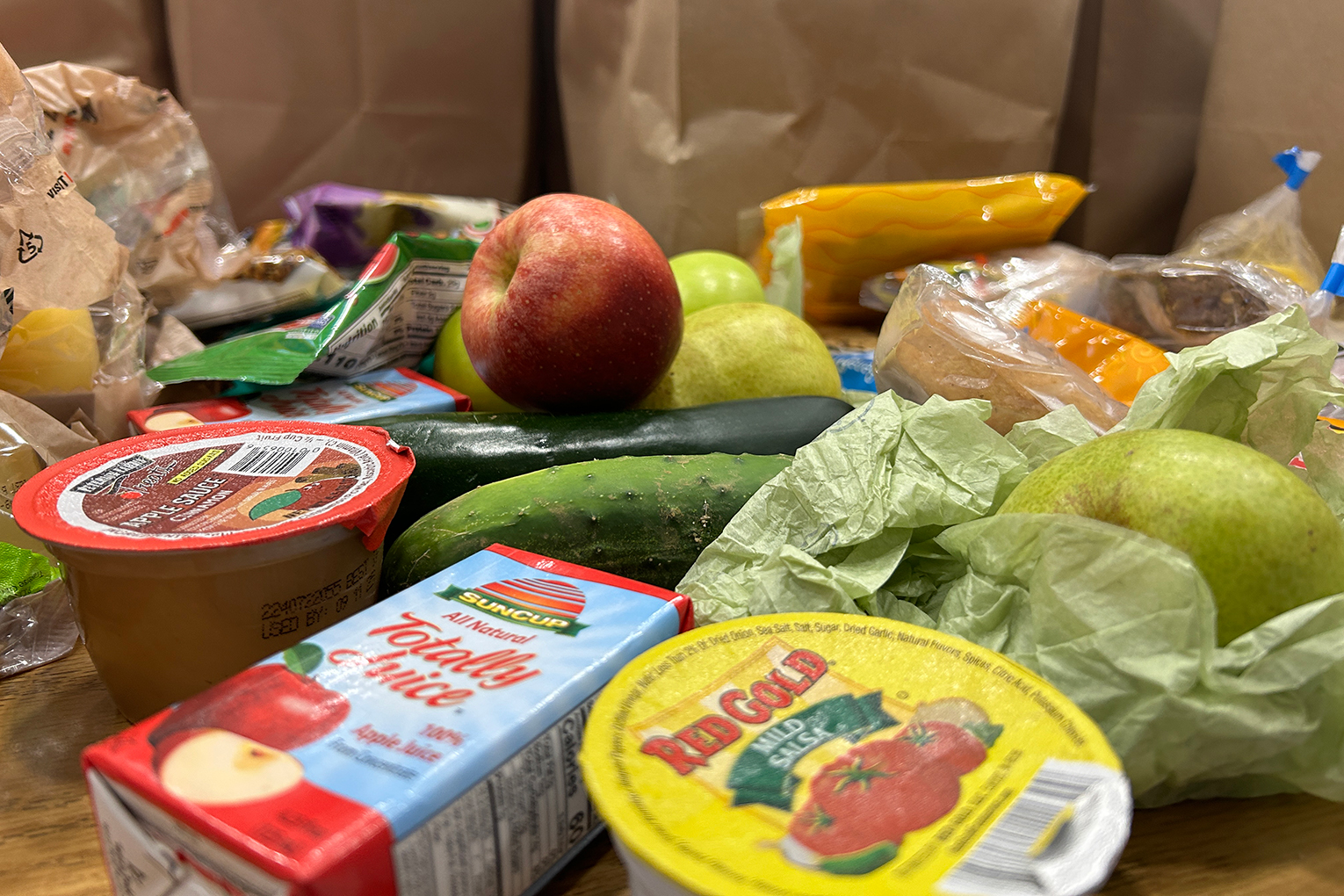
Commissioner of Education Robbie Fletcher, left, speaks with members of the Kentucky Board of Education while they were discussing their 2025 legislative priorities. Photo by Joe Ragusa, Kentucky Department of Education, Oct. 7, 2024
Kentucky Board of Education (KBE) members approved their list of legislative priorities for 2025 during the KBE meeting on Oct. 7-8.
“We all are a part of this engine, and if we want this engine running and running at high efficiency, we have to make sure we’ve got our energy directed and governed by our goals,” said KBE Chair Sharon Porter Robinson.
The top priority for board members is to support the work of the Kentucky United We Learn Council in its efforts regarding the state’s assessment and accountability systems.
The Kentucky Department of Education (KDE) and the Kentucky United We Learn Council have been working on prototypes for reimagined assessment and accountability systems that will prioritize innovation, personalization, local community and student voice, and the incorporation of vibrant learning experiences.
Another priority for the board is to secure funding for several key initiatives and programs, including professional development associated with the Kentucky Numeracy Counts Act (House Bill 162 (2024)), literacy coaches for the Read to Succeed Act (Senate Bill 9 (2022)) and additional funding to implement high-quality instructional resources.
Brian Perry, KDE director of government relations, said the legislative priorities should be viewed as long-term goals, especially several of the funding pieces that may need to be addressed when lawmakers start crafting the next budget. Lawmakers pass a two-year budget in even-numbered years, including the current biennial budget that was passed in April.
“As (the budget) timeline has accelerated over the past couple of cycles, we wanted to make sure that we’re able to inform legislators earlier about what some of the upcoming additional budget requests will be as they start planning that out, really starting early next year,” Perry said. “It’s really – especially for some of these bigger items – it’s really important that we start talking about those sooner rather than later.”
Perry noted some of the items, including funding for the Kentucky Education Technology System, will be large budget requests, so getting relevant numbers and rationales to lawmakers early will be important.
Board member Juston Pate said he wants to make sure school safety is included in the KBE’s priorities.
“I think keeping that on our forefront helps school districts keep it in the front of their minds,” he said.
Teacher recruitment and retention efforts also were among the priorities board members wanted to see supported by the legislature, along with funding for universal preschool and full-day kindergarten.
The full list of priorities can be found on the Kentucky Board of Education website.
Public Funding for Public Schools
KBE members unanimously approved a resolution supporting the use of state dollars to exclusively fund the common system of public schools.
Robinson said the framers of Kentucky’s constitution understood the importance of free public education for all children.
“The constitutional framers made clear that public funds were to be used to fund our common school system at the exclusion of all (other school systems),” she said.
In support of the resolution, Robinson referenced a passage from the U.S. Supreme Court ruling in Brown v. Board of Education, which was later adopted by the Kentucky Supreme Court in the landmark 1990 ruling in Rose v. Council for Better Education:
“[E]ducation is perhaps the most important function of state and local governments. Compulsory school attendance laws and the great expenditures for education both demonstrate our recognition of the importance of education to our democratic society. It is required in the performance of our most basic public responsibilities, even service in the armed forces. It is the very foundation of good citizenship. Today it is a principal instrument in awakening the child to cultural values, in preparing him for later professional training, and in helping him to adjust normally to his environment. In these days, it is doubtful that any child may reasonably be expected to succeed in life if he is denied the opportunity of an education. Such an opportunity, where the state has undertaken to provide it, is a right which must be made available to all on equal terms.”
“Our public schools, however, are challenged and weary, called upon to serve the diverse needs of students – needs exacerbated by a global pandemic, historic natural disasters and heightened mental health challenges,” Robinson said. “Our common schools accept and welcome all, but they do so in an environment of uncertainty when it comes to adequate funding.”
Robinson said that the resolution stresses KBE’s support for a system of common schools, where children have equal access to educational opportunities for all Kentucky children.
“We know that ‘separate but equal’ is not a reality that can be realized,” Robinson said.
Board member Diana Woods said she’s concerned that if public dollars are diverted away from public education in Kentucky, it could lead to a division of resources similar to the way segregation worked when she was a child in school.
“There are not enough (public) funds now,” Woods said. “And I come from a small rural county. Even after integration, there still was not enough money.”
Preston Graham, the non-voting student KBE member from Woodford County, said he wants the board to set a good precedent when it comes to advocating for the public school system it maintains.
“The main goal of the board has always been to support public schools, support a public education,” he said. “What are we doing if we don’t pass this resolution and say nothing?”
Commissioner of Education Robbie Fletcher said he has concerns about public dollars going away from the public school system. One of his main concerns is how assessment and accountability is handled with nonpublic schools.
“I think it’s our role as a board to make sure that all schools are accountable,” he said. “We owe that to our families. We owe that to our students. We need to make sure we give them every single opportunity possible to be successful. I believe that as we look at this resolution, it points out that our desire is to make sure that every student has an equal playing field.”
Robinson said the resolution is not intended as a directive to vote in a particular way in November; rather, the resolution is simply about supporting public funding for public education.
“This resolution reflects the board’s unwavering support for our common school system as a priority,” she said.
Commissioner Goals
The board signed off on a list of goals they want Fletcher to achieve in the 2024-2025 school year, his first at the helm of the Kentucky Department of Education.
The commissioner’s goals are:
- Provide strong leadership to advance the Kentucky United We Learn initiative across all educational levels through intentional engagement and strategic communication.
- Support the development of an assessment and accountability system that aligns with the Kentucky United We Learn moonshot and garners widespread support from educators, legislators and stakeholders.
- Increase KDE’s visibility and build genuine, trusting relationships with educators, administrators, students and families across the state.
- Develop and implement a comprehensive strategy to address critical education workforce issues, with a focus on teacher recruitment, retention and support.
- Build and maintain strong collaborative relationships with members of the Kentucky General Assembly.
Fletcher said there were no surprises about the goals outlined by the board as they were similar to the goals outlined during the interview process for the commissioner role earlier this year.
“It was very clear what the board was looking for in a commissioner,” he said. “Everything from building relationships with our communities, with our legislators, with our teachers, with our superintendents, with our board members; … (it) was obvious throughout the interview process that building relationships was a strong part of the expectation of the group.”
Fletcher said he’s confident he will achieve the goals outlined by the board with the support of KDE.
KBE members also signed off on a list of goals for themselves: to foster vibrant learning experiences, advance educational innovation and excellence and cultivate collaborative partnerships.
Robinson said the board’s goals should align with the commissioner’s goals.
“Given the board’s vision and ambitions, given the commissioner selection process and now given the responsibility to refine these expectations regarding a measurable accountability system for us all, we are trying to be fully aligned,” she said.
Assessment and Accountability
Meredith Brewer, KDE director of education policy, provided an update to board members on the latest stage of work transforming the Commonwealth’s assessment and accountability systems.
KDE is now entering a study phase of the most recent assessment and accountability prototype, which involves seeking input from all districts through Kentucky’s education cooperatives and conducting focus groups with 36 school districts. KDE also received 640 responses to an assessment and accountability prototype stakeholder feedback survey from the larger education community in Kentucky.
“We really put in a lot of effort to make sure everyone knew that this survey was available and invited them to participate,” Brewer said.
KDE innovation specialists also have been working with districts to gather information about how prepared they are to implement a vibrant learning experiences indicator as part of a new assessment and accountability system. Brewer said the goal is to have all 171 Kentucky school districts involved with that process.
Kentucky United We Learn Council members will conduct interviews with education stakeholders to receive additional input, Brewer said.
The next Kentucky United We Learn Council convening is Oct. 21-22, and members will be diving deep into data they have received through the feedback. Brewer said the goal is to have a prototype for Kentucky United We Learn Council members to formally endorse during a virtual meeting in November.
Following that endorsement from the Kentucky United We Learn Council, Brewer said the plan is to present the final prototype to the Local Superintendents Advisory Council and KBE in the final weeks of 2024.
Ultimately, Brewer said a finalized assessment and accountability proposal will be developed for the Kentucky General Assembly to consider as early as the 2026 legislative session.
To learn more background and explore specific details about the latest assessment and accountability prototype, visit KDE’s Reimagining Assessment and Accountability Prototype Resources webpage.
In other business, board members:
- Approved multiple waivers for Martin County to build a new Inez Elementary School;
- Approved a waiver for Paris Independent related to property acquisition for a new parking lot;
- Approved changes to 704 KAR 3:365 regarding complaint procedures for programs under the Elementary and Secondary Education Act of 1965. This action would align with updates made by the U.S. Department of Education on the amount of supporting evidence required for complaints; and
- Awarded the 2024 Kelly Award for Business and Education Partnership to Meredith Rozanski, executive vice president of operations for the Bowling Green Area Chamber of Commerce.




Leave A Comment